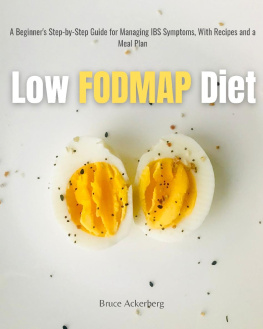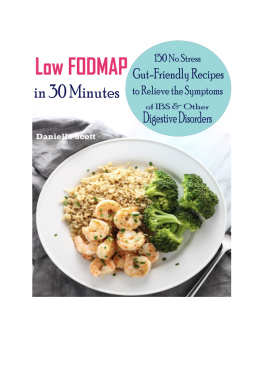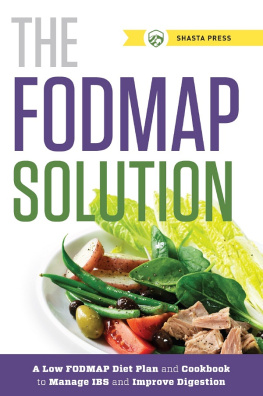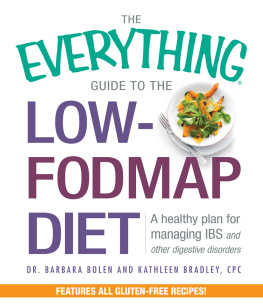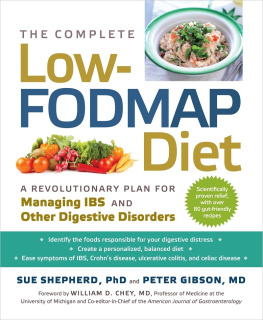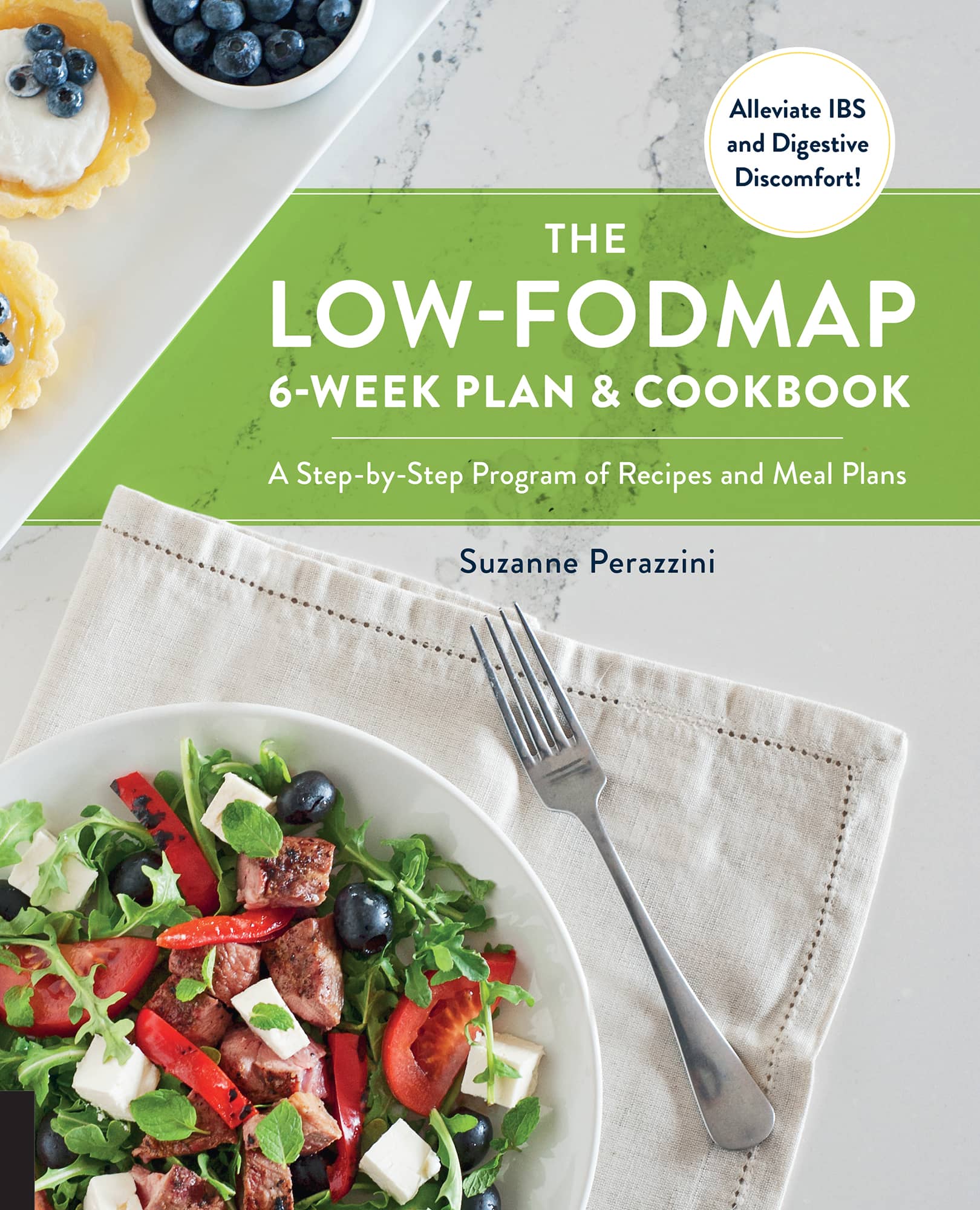THE
LOW-FODMAP
6-WEEK PLAN & COOKBOOK
A Step-by-Step Program of Recipes and Meal Plans
Alleviate IBS and Digestive Discomfort!
Suzanne Perazzini

Introduction
IBS. Its the bane of your existence. Its the enemy at the gates that never leaves you alone. Its the siege that saps your energy and drains your personal power. When youre battling IBS, youre at warwith yourself and your own body. You advance an inch, and then the enemy knocks you backward, keeping you in checkand keeping your life on hold.
But what if you could end this war? What if you were empowered to fight with determination; to find your way back to health; and to live a joyful, fulfilled life? Imagine if the following were true:
You were pain-free: no bloating, diarrhea, or constipation.
You had the knowledge to help you make healthy, low-FODMAP food choices.
Youd developed a nutritionally-balanced diet that was tailor-made for your individual needs.
You had the strength to stay the course into the future, having overcome the mental blocks that stood in your way.
You had a new plan and a new set of habits that promoted a balanced lifestyle, to help support the diets effects.
You might think this sounds too good to be true. But it isnt. This can be your realityyour new normal. And it starts when you decide to take your life and your health into your own hands, and you become proactive about getting well. The low-FODMAP diet has been scientifically provenat research centers at Monash University in Melbourne, Australia, and the University of Michiganto help eliminate symptoms in the majority of IBS sufferers. This program could be your savior.
Let me introduce myself: My name is Suzanne Perazzini. Im a certified nutritional therapist, and Ive suffered from irritable bowel syndrome (IBS) all my life. Ive always been obsessed with finding the location of the nearest toiletone of the first signs of potential IBSand I spent decades turning down invitations that might expose my secret because IBS is a secret affliction that sufferers keep well hidden. After all, discussions of bowel functions dont make for polite conversation!
Over the years, I bounced from health practitioner to health practitioner without finding any definitive answers. But with the advent of the Internet, I started to do my own research. I Googled my symptoms over and over again until the information available on the Internet caught up with my needs, and eventually, I learned about the low-FODMAP diet.
At first, I ignored the diet. It was so complicated, and it seemed almost impossible to understand: FODMAPs are found in nearly all foods, so if we eliminated all foods containing them, wed die from malnutrition. And so I kept ignoring it. But one day, I was desperate enough to stop and read about the diet a little more closely. Thats when it all fell into place. My symptoms were all there. I concluded that I had IBS and that the low-FODMAP diet was the answer.
Thus began a period of intensive research and experimentation. There was only a limited amount of information on the diet available on the Internet at that time, and much of it was conflicting. Still, even though it took about a year to assemble the many moving parts of the diet and to eliminate all my symptoms, I knew I was onto something, so I persevered through all the hiccups and disappointments while I figured it out.
Lets fast-forward to the present day. My life has now been completely revolutionized by the low-FODMAP diet and by the other lifestyle changes Ive made to support my health. Plus, Im now a certified nutritional therapist and trained teacher: I coach IBS sufferers on how to implement this fabulous-but-complicated low-FODMAP diet in their own lives. I also teach them how to remove or reduce other gut irritants and how to make the necessary lifestyle changes to minimize the symptoms of their IBS. Every day I help people from all over the world become well so that they can finally be free from the impossibly heavy burden of IBS.
This book contains all the knowledge Ive accumulated over several years of living on the diet. It also includes everything Ive learned from the hundreds of coaching clients Ive helped, as well as the substantial research Ive conducted and the many in-depth courses Ive taken on the digestive system and the gut microbiome.
The first section explains IBS and the low-FODMAP diet. The second section is the exact program I use with my coaching clients. It consists of daily meal plans, recipes, a diary page for recording vital information, a weekly exercise to help you establish a balanced lifestyle to manage your IBS, and a weekly section on integrating the diet into your everyday life. Each week ends with a case study to inspire you to dig deep and to help you stay the course.
This will be an exciting journey toward a life free from pain and embarrassment. Youre about to embark on the ride of your lifeso hold on tight!
PART 1
FODMAPS AND THE LOW-FODMAP DIET
CHAPTER 1 | Understanding IBS |
Irritable bowel syndrome (IBS) is a common chronic disorder that involves the large intestine and causes bloating, abdominal pain, constipation, and/or diarrhea. Unfortunately, its exact cause is still unknown, but scientists currently believe that visceral hypersensitivitythat is, a highly-sensitive intestinal tractreacts to the normal distension of the gut by changing motility patterns and sending messages to the brain that may be misinterpreted. This makes the intestines contract or spasm in an abnormal way, causing pain. These contractions can either speed up the passage of matter through the bowel, resulting in diarrhea, or it can slow it down, resulting in constipation. The low-FODMAP diet reduces fermentation in the gut, thereby decreasing gas production, minimizing the distension of the bowel, and therefore reducing symptoms.
Other factors may play a part in IBS, too. Research is underway on the gut microbiomethe collection of microbes or microorganisms that inhabit the digestive systemand it may play a part in the IBS puzzle. The effect of food chemical intolerance is also being investigated. Such chemicals may stimulate nerve endings in hypersensitive people, including those with IBS, resulting in pain and other symptoms. This research is ongoing, and scientists have yet to confirm whether eliminating food chemicals could help reduce IBS symptoms.
Still, scientists have identified a number of possible IBS triggers. They include the following:
INHERITED GENES
A number of studiesincluding a 2008 study published in Neurogastroenterology & Motility and a 2010 study published in the Journal of Pediatric Gastroenterology and Nutritionhave shown that the chances of contracting IBS are higher in the sibling or child of an IBS sufferer. Both male and female relatives of a person with IBS are two to three times more likely to have it, too. Still, it is not clear whether this is due to hereditary or environmental factors.


